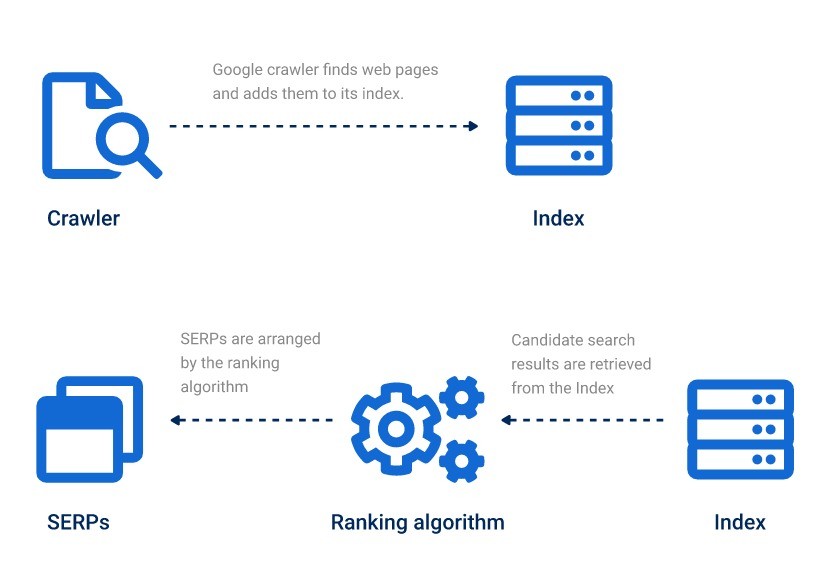A Search Engine Results Page (SERP) is the display of responses provided by a search engine after a query is made. SERPs consist of organic search results, paid Google Ads, and other search features.
Understanding SERPs is crucial for both users navigating the internet and businesses aiming to boost online visibility. The layout and content of SERPs vary based on the keywords used and the type of search conducted, which can include local listings, videos, images, and news.
Search engines like Google use complex algorithms to determine the most relevant results. These results offer a snapshot of the web’s vast information, directly tailored to the user’s query. For marketers and SEO specialists, ranking well on SERPs is a primary goal, as higher positions typically lead to increased website traffic and potential business opportunities. Crafting content that aligns with search intent while utilizing effective keywords can significantly enhance SERP rankings.
What Is A SERP?
Definition
A search engine result page is what appears after you use a search engine like Google. It shows a mix of sites, images, and videos linked to your search words. There’s more to it than meets the eye. The SERP includes organic search results, search advertising, local search listings, and sometimes google images.Importance
Why should you care about SERPs? If you run a website, they are key to being seen. Think about local search engine optimization (local SEO). It helps stores pop up in SERPs when you search ‘flower shop near me.’ SERPs are also vital for search engine marketing (SEM). Businesses pay for search advertising through pay per click (PPC) to climb to the top of these pages. But it’s not just about ads. Great content and keyword research are the soul of SERPs. They help websites rank well without paying. Understanding SERPs can improve findavility – the chance someone finds your site online. High-quality backlinks, avoiding spamdexing, and aligning with user intent boost your SERP ranking. Beware of search engine scraping, though! It’s all about playing fair and providing value. Plus, there’s always something new. Ever heard of Facebook Graph Search? It’s another type of SERP that helps you find out more through your social network.
Credit: www.linkedin.com
Components Of A SERP
Organic Results
Organic results are listings on search engine pages that appear because of their relevance to the search query. Unlike paid results, these are not advertisements. They are ranked by the search engine’s algorithm based on factors like relevance, keyword research, backlinks, and content quality. Organic search results are essential for long-term search engine marketing success.- Rich snippets
- Sitelinks
- Images
- Video Carousels
- News Articles
- Twitter posts
- Google Scholar articles
Paid Results
At the very top and bottom of the SERP lie paid results, a product of search advertising and pay per click (PPC) campaigns. These are advertisements directly related to user intent and are marked with an “Ad” label. They are the first point of contact for many users looking for transactional information. Google Shopping ads and local search engine optimization tactics also contribute to these paid listings, with a focus on products, services, and specific locations.Featured Snippets
An Answer box or featured snippet is a format that often appears above the organic results, providing a quick answer or summary snippet from a webpage. It is especially prevalent for informational search queries and aims to give users the information they seek at a glance. Featured snippets can come in various forms:- Paragraphs
- Lists
- Tables
Types Of Search Results
Dive into the diverse world of Search Engine Results Pages (SERPs) and discover the various types of search results. Whether for informational, navigational, or transactional purposes, SERPs cater to all user needs with an array of result types.
Web Results
Web results, or organic results, form the core of SERPs. These are the listings that search engines deem most relevant to users’ search queries. Users often find:- Featured snippets that give quick answers.
- Rich snippets with extra info like ratings.
- Sitelinks that help navigate a website.
- People Also Ask boxes for related questions.
Image Results
The Images tab on SERPs showcases visual content related to the search query. Useful for informational search queries, they include:- Photos
- Graphics
- Carousels for multiple image viewing.
Video Results
Video content has a special place in SERPs, especially for tutorials and entertainment. Video results include:- Clips from platforms like YouTube.
- Video carousels to browse through selections.
News Results
For the latest updates, News results provide articles from various publishers. They feature:- Headlines
- Story summaries
- Direct links to news sources.
Map Results
Search queries with local intent trigger Map results. Also known as the Local Pack, they display:- Location pins on a map.
- Business details like hours and reviews.
- Links for directions and navigation.
- Advertising: Paid results above organic listings.
- Knowledge panel: Summarized info on a topic.
- Answer box: Instant answers at the top of a page.
- Google Scholar: Academic papers and journals.
- Google Shopping: Product listings and offers.
- Jobs: Openings based on the search query.
- Twitter: Real-time tweets related to the query.

Credit: www.ovrdrv.com
Rankings On A SERP
Imagine the internet as a large store, and Google as the aisle sign. This sign tells you where to find what you want. Each spot a website earns on this sign is a rank on a Search Engine Results Page, or SERP. Better spots mean more people see your site. Let’s dive into what makes some sites rank higher than others.
Keyword Relevance
Think of keywords as secret codes to unlock treasure chests. When you use the right code, the chest opens. In the world of SERPs, using the right keywords on your webpage is like using these codes. They match what people type into search engines. The better the match, the higher the chance of a top spot on the SERP.
- Choose keywords wisely: Pick words that your audience searches for.
- Place them smartly: Insert keywords in titles, headings, and throughout your content.
- Keep it natural: Use keywords in a way that sounds human.
Quality Of Content
Just like a chef wins customers with delicious meals, websites win visitors with top-notch content. High-quality content is the dish that Search Engines love to serve. What’s in this dish?
- Originality: Your content must be unique.
- Value: It should teach something new or solve a problem.
- Depth: Cover the topic thoroughly.
Keep your content fresh and updated. Search Engines will notice and might reward you with a higher rank.
User Experience
A great website is like a friendly guide in a museum. It makes sure you enjoy the tour without getting lost. Search Engines want users to have this kind of smooth experience. They look at:
- Speed: Fast-loading pages win the race.
- Mobile-friendliness: Your site must work well on phones.
- Navigation: It should be easy to find stuff on your site.
If users stay on your site longer, it tells Search Engines they like what you offer. This can boost your SERP rank. Ranks on a SERP can change. They depend on the right keywords, quality content, and user experience. Now, let’s improve your website to climb higher on that aisle sign.
Factors Influencing SERP Rankings
Backlinks
Backlinks, also known as inbound links, are major players in search engine optimization (SEO). Think of them as votes of confidence from one website to another. The more quality backlinks a page has, the more likely it is to rank high on search engine results pages. Google’s algorithm sees these links as endorsements, suggesting that your content is valuable and relevant.- Avoid spamdexing; only pursue quality links.
- Engage in ethical link-building practices to maintain findability.
- Use backlink tools for better insight into your link profile.
On-page Optimization
On-page optimization involves tweaking elements on your site to improve rankings. It’s all about making your site’s pages delicious for search engines. When they crawl your site, you want them to find optimized titles, descriptions, and content.| Element | Optimization Tip |
|---|---|
| Title Tags | Include targeted keywords naturally. |
| Meta Descriptions | Write compelling summaries for click-throughs. |
| Content | Match user intent with quality, relevant information. |
Mobile Friendliness
With the rapid increase in smartphone use, mobile friendliness is a top factor for SERP dominance. Sites that offer a smooth mobile experience tend to outrank those that don’t. This is why responsive design is not just a nice-to-have, but a must-have.- Test your site with Google’s Mobile-Friendly Test tool.
- Ensure quick load times and easy navigation on mobile.
- Aim for a seamless user experience across all devices.
SERP And SEO
Optimizing For Serps
To climb to the top of SERPs, your strategy must align with how search engines work. Here’s what to focus on:- Keywords: Pick the right ones that your audience searches for.
- Content: Create high-quality, unique, and relevant content.
- User Experience (UX): Ensure fast load times and mobile-friendliness.
- Backlinks: Quality links from reputable sites improve credibility.
- Local SEO: Optimize for local search queries to target nearby users.
SERP Analysis
Analyzing top-ranking pages can uncover why they perform well. Use these insights:- Identify common keywords and topics.
- Study the structure and format of content.
- Observe on-page optimization tactics.
- Look at the types of backlinks.
SERP Features
Understanding SERP features is crucial. They influence how users interact with search results. Features to be aware of include:| Feature | Description |
|---|---|
| Featured Snippets | A quick answer box often appears at the top of the SERP. |
| Knowledge Graphs | Information panels that display data about entities like people or places. |
| Local Packs | A map and listing of businesses related to a local search query. |
| Image Packs | A row of images related to the search query. |
SERP Tools
Keyword Research Tools
Keyword research tools are the cartographers of the SEO world. They help you discover search terms that users enter into search engines. By identifying the right keywords, you can craft content that aligns perfectly with what your audience is searching for. Popular keyword research tools include:- Google Keyword Planner: A free tool perfect for beginners to identify keywords.
- Ahrefs Keywords Explorer: Offers in-depth keyword data and analysis.
- SEMrush: Presents valuable keyword insights and competitor keyword strategies.
Rank Tracking Tools
Rank tracking tools help you monitor your website’s performance in SERPs. They keep a vigilant eye on ranking positions for crucial keywords. Examples of top rank tracking tools include:- Google Search Console: Offers free tracking of your site’s performance in Google.
- Moz Pro Rank Tracker: Tracks keyword rankings over time across multiple search engines.
- SE Ranking: A versatile tool for monitoring keyword positions in real-time.
Competitor Analysis Tools
To stay ahead, analyzing your competition is vital. Competitor analysis tools let you peek into their strategies. With these tools, you can:| Tool | Features |
|---|---|
| SpyFu | Reveals competitors’ most profitable keywords and ads. |
| SimilarWeb | Delivers insights into competitors’ traffic sources and ranking. |
| Alexa | Provides competitor website traffic analysis and market share. |
SERP Trends And Updates
Featured Snippet Updates
Google’s featured snippets offer a quick answer to user queries. They appear in a prominent box at the top of SERPs. Google updates these snippets to provide the most relevant answers. This could involve pulling data from new sources or adjusting the criteria for which results get the coveted spot.- Refinements to the algorithm that selects which content qualifies.
- Improved precision to match user intent.
- Layout changes to enhance visibility and usability.
Algorithm Changes
SERP rankings shift with every algorithm change. Staying informed is crucial. Algorithms aim to elevate high-quality, relevant content. They filter out anything deemed low-quality or not useful.| Update Name | Release Date | Impact |
|---|---|---|
| Core Update | December 2021 | Comprehensive relevancy improvements. |
| Page Experience Update | May 2021 | User experience factors enhanced. |
| BERT Update | October 2019 | Natural language processing refined. |
The Future Of SERPs
Voice Search Integration
Voice search is altering how users interact with search engines. This technology allows users to perform searches by speaking rather than typing. SEO strategies must adapt to cater to this growing trend. Focus points include:- Natural language processing
- Conversational queries
- Local search engine optimization
Artificial Intelligence Impact
Artificial Intelligence (AI) will greatly impact SERPs. AI algorithms can analyze data more efficiently than humans. This results in a better understanding of user intent and improved search advertising. AI influences several aspects of SERPs:| AI Impact | Description |
|---|---|
| Keyword Research | AI helps in predicting more accurate keywords to target user queries. |
| Personalization | Search results become more tailored to individual user preferences. |
Frequently Asked Questions Of What Is A Serp? Search Engine Results Pages Explained
What Is The Results Page Of Serp?
The results page of a SERP displays the listings returned by a search engine in response to a query. It includes organic results, ads, and possibly rich snippets or knowledge graphs.
What Are The 3 Common Elements For Each Result On Serp?
Title, URL, and meta description are the three common elements for each result on a search engine results page (SERP).
What Information Will Come Out From Serp?
A SERP reveals a list of web pages, local listings, and paid advertisements relevant to your search query. It also displays featured snippets, questions people also ask, and images or videos when applicable.
What Do Local Results Display On Serps?
Local results on SERPs display business listings, maps, reviews, and contact information relevant to the searcher’s location-based query.
What Is A Serp In Seo?
A SERP is a Search Engine Results Page that displays after a query is entered into a search engine.
How Do Serps Function?
SERPs function by listing web pages, videos, and local listings relevant to a user’s search query using algorithms.
What Are Organic Results?
Organic results are unpaid listings on a SERP that search engines deem most relevant to the query.
What Is A Featured Snippet?
A featured snippet is a highlighted search box that answers a query directly, often displayed at the top of a SERP.
How Often Do Serps Change?
SERPs can change frequently due to factors like algorithm updates, current trends, and new content being published.
What Affects Serp Rankings?
SERP rankings are influenced by website relevance, authority, content quality, user engagement, and SEO practices.
Conclusion
Understanding SERPs is crucial for enhancing your online visibility. They’re the showcase for your digital presence, vital for drawing clicks and gaining traffic. Mastering SEO tactics helps you climb the SERP ladder, increasing your chances of being noticed by potential visitors.
Keep refining and updating your strategy, and watch your website rise to the top of those valuable search engine results pages.


Pingback: What is Topical Authority in SEO? A1 Technovation
Pingback: What Is Semantic SEO and How to Optimize for higher ranking
Pingback: On-Page SEO | The Complete Guide for 2024 | A1 Technovation
Pingback: What Is Googlebot & How Does It Work? - A1 Technovation